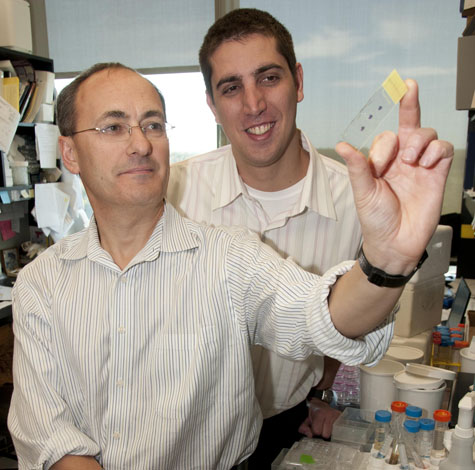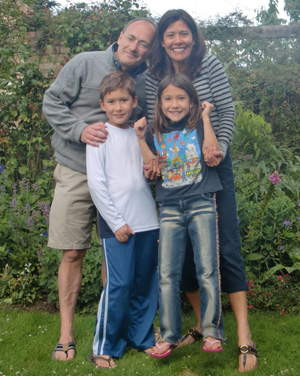
When Matthew Ellis was 10 years old, growing up in Kibworth Beauchamp, England, he told his religious studies teacher he wanted to be a doctor.
“I have no idea why,” says Ellis, MD, PhD, now professor of medicine at Washington University School of Medicine and head of breast oncology at the Siteman Cancer Center at Barnes-Jewish Hospital and Washington University School of Medicine. “I never considered doing anything else.”
Though he was a driven student who loved the sciences, especially biology, Ellis says he did not necessarily excel at the hands-on elements of laboratory work.
“I managed to electrocute myself studying whether vegetable oil could be used as a lubricant in engines,” he says. “I tripped all the circuit breakers in the physics lab.”
He also set off school fire alarms when a light filter he was using to watch the conversion of sucrose to glucose caught on fire. And then there was that trip to the hospital for stitches during his woodworking exam.
“I learned I was much better at thinking than actually doing lab experiments,” he says with a laugh. “Which is where I’ve ended up now. Others do the experiments, and I interpret the data. It’s much safer.”
Decoding the DNA of cancer
It may be safer, but the amount of data Ellis interprets is staggering. His work with the Genome Institute at Washington University has focused on sequencing entire breast cancer genomes. A single genome contains the 3 billion “letters” making up a person’s DNA.
In a given study, each patient’s healthy genome is sequenced as many as 30 times to ensure accurate data. This sequencing is repeated in the patient’s cancer cells to see what makes them different. And studies include not just one or two patients, but hundreds.
“The size of the data sets we’re generating can be daunting,” says Elaine Mardis, PhD, professor of genetics and co-director of the Genome Institute. “But Matthew really rolls up his sleeves and helps to interpret the data in the context of what he knows about tumor biology. In this way, he is able to tie together what he knows about the tumor samples and the clinical response and ultimately extend these results to his patients.”
In fact, the massive sequencing and computing capacity of the Genome Institute and the genomics expertise that goes with it were major reasons Ellis came to Washington University in 2003. Ellis says conversations with Mardis and Timothy Ley, MD, the Lewis T. and Rosalind B. Apple Professor of Medicine, sold him on the move.
“They talked to me about how the Genome Institute had contributed to the first drafts of the human genome project,” Ellis says. “And they talked about generating whole cancer genome sequences. And I just thought that, as a vision, was earth-shattering. That’s like a physicist being asked if he’d like to come work with the Large Hadron Collider. I couldn’t move fast enough.”
New treatments emerging
Ellis’ road to breast cancer medicine and DNA sequencing began in the late 1980s when he was a clinical fellow with the Imperial Cancer Research Fund in London. There, he started seeing patients with breast cancer and developed an interest in this common disease that afflicted women for no obvious reason.
“It’s not as though these patients were smokers or abused alcohol,” Ellis says. “Through absolutely no fault of their own, they were dying of a disease that no one understood. Yet there were inklings that it wasn’t completely hopeless.”
Chemotherapy made patients very ill, but for reasons that were not well defined, caused tumors to shrink. And the new drug tamoxifen improved treatment of estrogen receptor positive tumors, so called because they feed off of estrogen.
“There were new treatments emerging, though we didn’t have a good idea of how they worked,” Ellis says. “And on a parallel track, there were improvements in understanding the molecular biology of cancer. I was really interested in bringing those two fields together — the basic science of cancer and clinical oncology.”
After medical school, Ellis earned a doctorate in molecular genetics from the Royal Postgraduate Medical School in London. Toward the end of his doctoral work, Ellis met breast cancer expert Marc Lippman, MD. Hearing Ellis’ career interest, Lippman invited him to pursue research in Washington, D.C., at Georgetown University, where Lippman had just become director of the cancer center.
While at Georgetown in the mid 1990s, aromatase inhibitors entered the field and proved even better than tamoxifen at shrinking estrogen-fed tumors. Since then, using aromatase inhibitors to shrink tumors before they are surgically removed has become standard of care for certain patients. Such progress, including reducing mastectomy rates, is due in part to the studies Ellis has done over the past 15 years.
“Matthew is an energetic guy who thinks outside the box and keeps at the cutting edge in breast cancer research,” says John Dipersio, MD, PhD, the Virginia E. and Sam J. Golman Professor of Medicine at the School of Medicine. “When we recruited him, his research career was on its way up, and his science overlapped with strengths of Washington University — our Genome Institute is one of the few places in the world that can unlock the mysteries of mutations in breast cancer.”
One of those mysteries is why some patients with estrogen receptor positive breast cancer respond well to estrogen-lowering drugs and others don’t. Sequencing these tumors and comparing the two types may provide answers.
“Right now, patients whose tumors do not respond to estrogen-lowering drugs are given chemotherapy,” Ellis says. “But the idea is to treat these resistant cases with much smarter drugs that are targeted to the exact molecular wiring behind the tumor’s estrogen independence. That’s where the genomics comes in.”
International scholars
While at Georgetown, Ellis met his wife, Rosanamary, who was working at the World Bank. A native of Brazil, Rosanamary’s influence has led Ellis to become involved with the university’s McDonnell International Scholars Academy.

Courtesy photo
The Ellis family on a trip to England: (from left) Ellis; wife, Rosanamary; son, Alexander; and daughter, Sophia.
Serving as the university’s ambassador to Brazil and the University of Campinas, Ellis recruits students to come to Washington University for graduate work. So far, he has secured scholarships for three students — one in physics, one in biomedical engineering and one in his own lab, Rodrigo Goncalves, MD, who is pursuing a master’s of science in clinical investigation.
“My work in Brazil is expanding to include a clinical trial in a public hospital in Sao Paulo, and Rodrigo is helping me set up that program,” Ellis says. “The idea is to develop new approaches to treating breast cancer in health-care economies with limited resources.”
Genome-forward medicine
Beyond his work in Brazil, Ellis says he is most excited about the prospects of what he calls “genome-forward” medicine. Unlike most studies that sequence DNA after the fact, Ellis wants to analyze genomes before treatment begins and use that knowledge to guide therapy.
“We are beginning to find information that might have value to patients,” he says. “If we can do the genome analysis up front, we could help them get the most accurate prognosis or get them into the right clinical trial. I’m most excited about being able to use genomics to direct therapy for individual patients.”
Indeed, even amidst mountains of data, Ellis never loses sight of his patients.
“He’s a fantastic doctor,” Mardis says. “He can be a hard-nosed, no-nonsense guy when it comes to discussing scientific data, but his patients absolutely adore him.”
And though Ellis’ time outside work centers on his family — especially his children Alexander, 10, and Sophia, 8 — he still finds time for the occasional fishing trip.
“About 1 percent of breast cancer cases occur in men,” Ellis says. “One older gentleman I treated has adopted me and takes me fishing out on the rivers of Missouri. And I really enjoy that.”
Fast facts about Matthew Ellis
Born: Romsey, Hampshire, United Kingdom
Family: Wife, Rosanamary, and children, Alexander, 10, and Sophia, 8
Books: Ellis enjoys books about Brazil and its history. Most recently, The Lost City of Z: A Tale of Deadly Obsession in the Amazon by David Grann.
Favorite vacation spot: Buzios, Brazil